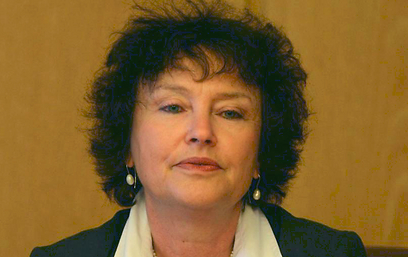
Bank of Israel Governor Karnit Flug is very displeased with the budget proposals that are flying back and forth between the Finance Ministry and the Defense Ministry, between the Defense Ministry and the prime minister, and from the prime minister back to the treasury – like billiard balls on a green felt-covered table. This, she believes, is not the way to formulate an effective economic policy.
In an interview ahead of the Jewish New Year, she warns, first and foremost, against relying on unrealistic forecasts. "Based on a Bank of Israel analysis," she says in her soft voice, which sounds a little edgy this time, "the budget deficit for next year will be some 0.2 percent higher than the treasury's forecasts."
In other words, the treasury is constructing an unrealistic budget with an unrealistic deficit. While treasury officials speak, for example, about a deficit of 3.5 percent of the Gross Domestic Product, Bank of Israel assessments indicate that under the exact same budget conditions, the deficit will reach 3.7-3.8 percent of the GDP. And this, Flug says, is "most undesirable." According to the governor, "The desirable deficit is 3 percent of the GDP."
Flug's warnings are particularly significant in light of the implied go-ahead given by leading credit-rating agency Standard & Poor's to Finance Minister Yair Lapid to increase next year's budget deficit to 3.6 percent of the GDP, some NIS 40 billion, without having to be worried about Israel's credit rating. A stamp of approval for a budget deficit of this magnitude from the stringent economists at S&P appears to allow Lapid to agree to another addition to the defense budget. And this is where the governor steps in and says: Whereas your figures, honorable Minister Lapid, note a deficit of 3.4 percent, mine already indicate one of 3.6 percent. You are already on the very edge, as far as S&P are concerned too. So don't even think about going any higher.
More taxes
The main dispute centers on tax-collection forecasts. The treasury is more optimistic, whereas the central bank is more pessimistic. Today, with the latest figures from the Central Bureau of Statistics indicating just a 2 percent growth rate this year – in other words, stagnation in growth per capita – the danger of slipping into heavy deficits appears real.
But the deficit issue does not lie at the heart of the conflict between the governor and the finance minister. Flug harbors a different approach to Lapid when it comes to financing the additional and steep defense expenses. According to the governor,
"Under the current conditions of the Israeli economy, the addition to the defense budget shouldn’t come from a further reduction in civilian expenditure, but instead from an increase in state revenues." Put simply – "from an increase in taxes, whether they be direct, by raising income tax for example, or indirect, by reducing benefits and tax breaks." Minister Lapid, as is common knowledge, thinks differently. He says: Anything but taxes. The governor says: Only taxes.
Flug argues her position: "The civilian public service in Israel – education, health, welfare, professional training – are very low in relation to the GNP when set off against other countries. It certainly wouldn't be a good idea to reduce them even further."
To the contrary, she advises investing more in them – more in infrastructure, more in education, more in tools that will allow various population groups to enter the job market.
"Such investments," Flug says, "encourage the incorporation of the weak into a productive economy and have a positive effect on the economy's ability to grow on the whole."
The growth rate has clearly eroded in recent years – from 3 percent per capita to 0 percent per capita.
'No rich uncle'
Without referring directly to Lapid's outspoken opposition to raising taxes, Flug explains to those who require an explanation: "The State of Israel doesn't have a wealthy uncle who can fund the country's significant defense costs. We and we alone will pay for them – either we pay in the form of taxes, or we pay in the form of fewer services we receive from the public sector; and then we will have to pay dearly for these services in the private market."
Flug rejects outright the third option - of funding the ongoing increase in the country's defense expenditure by a massive increase in the deficit. She views such a move as particularly detrimental.
The S&P overview includes much praise for your interest rate policy, but also a sentence that implies that the Bank of Israel may turn in the future to the use of "irregular" monetary tools if the recession deepens. They are referring of course to the purchase of government bonds. Do you see that as a practical option?
"I am not ruling out a step like that too," says Flug. "Central banks have at their disposal a range of tools that can be implemented once the interest rate has fallen to zero. Purchasing bonds is one of them; all things in keeping with the circumstances. Our interest rate policy takes into account numerous indicators, including for example the interest rate set by the American central bank governor. She, by the way, doesn't have to consider our interest rate."
All said and done, how would you define your relationship with Lapid?
Flug responds in exemplary diplomatic language: "The finance minister and I meet on a regular basis. We don’t always agree on everything; but we have an open dialogue."
."
An open dialogue is often a simile for significant differences of opinion – over the bill proposing zero-VAT on first-time home purchases for example. Governor Flug reiterates her assessment that "under the current circumstances in which the housing supply is limited, zero-VAT on new homes is unlikely to lower their prices. Moreover, we cannot be sure we'll be able to effectively monitor the prices; an apartment is a complex, non-standard product."
The VAT exemption, if it were to go into effect, would mean a loss of some NIS 2.5 billion in taxes in 2015, Flug estimates.
Flug disagrees with the contention that the middle-class in Israel is a "dairy cow of taxes."
According to the governor, and based on Bank of Israel studies, "The middle-class that pays income tax is paying less tax today than it did in the past. The tax breaks, on the one hand, and the addition of a second breadwinner to the job market, on the other, explain the increase in the available income of the average Israeli household. Its income has increased at the same rate at which the economy is expanding."
But dry statistics, Flug admits, "do not reveal the entire picture; the standard of living is a multi-dimensional phenomenon."
And what about the poor? The Alaluf Commission, charged with coming up with a strategy for the fight against poverty, has submitted its recommendations, I remind the governor, but they have yet to be discussed by the government. What will become of them now in light of the budgetary shortfall?
Flug: "Some of the recommendations of the Alaluf Commission, particularly with respect to negative income tax, are worthy of implementation. The commission also made recommendations that involve a significant increase in state allowances. I don't support those."
It appears that the two, Flug and Lapid, have a different view of the role of the Bank of Israel governor as the government's primary economic advisor. As far as Lapid is concerned, offering advice is not much more than voicing one's opinion and presenting a position backed by numbers. From the perspective of the governor, advising the government on economic matters also means influencing its decisions. As Flug sees things – and just as Stanley Fischer, her predecessor, did – the Bank of Israel is a professional, independent and influential advisor, and not just one who makes its voice heard.
When it comes to her relationship with Prime Minister Benjamin Netanyahu, Flug chooses warmer words: "It's a good relationship," she says, stressing: "The prime minister has much respect for professional economic analysis. He places much importance on maintaining a low government deficit."
To be more precise, he did place much importance on the matter – until Sunday.

















